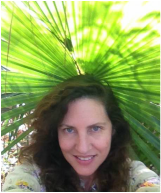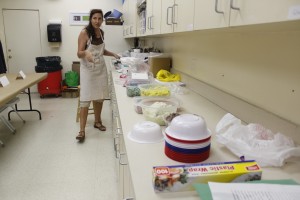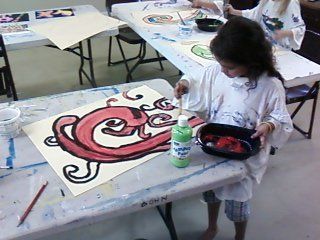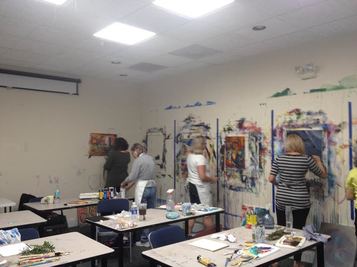Art & Wellness
Welcome to my expressive arts and art therapy studio. I facilitate art and wellness workshops as well as traditional painting and art classes. I use art and wellness so that students/clients can learn how to use self expression for self discovery and healing.
Authentic creative expression through art making, music, creative writing, and other creative endeavors can produce healing abilities in each of us and help us to reflect on our life story. How can we go from expressing doubt, pain, trauma or fear to expressing Joy? How can we stimulate joy through creative mindfulness? Art and wellness programs are built with the goal that the process of art making is a journey of self discovery. This process can be the focus instead of the product. If you feel that you cannot draw or paint it does not matter since an art therapist or qualified art and wellness instructor should be able to direct you through the joy of playing with the art materials to enhance self discovery. Using deep breathing and mindfulness is a way to enhance the creative experience as you learn to pay attention to the flow of the paint or the feel of the pastels. Often, abstract play leads to visual storytelling that empowers the student or client. Those are some of the goals of art therapy and art and wellness programs. More about Expressive Art and Wellness Workshops Similar to art therapy, these workshops combine wellness and art expression, focusing on the process over the product. I use deep breathing, creative visualization, stretching, painting processes, mixed media and other media choices to encourage groups to use creative expression to help tell their stories. Using symbols and metaphors can also help individuals to creatively visualize their own stories and find their own answers. Students learn to set their own therapeutic goals and are the experts in their own expression. As a teaching artist and art therapist I am here to attend to your creative journey as it unfolds before you. Humor is a part of the journey! Having fun and letting go to explore processes is the guide to self discovery. I also want the workshops to be fun, playful and bring out your inner child. Besides art and wellness workshops I am now available for private art and wellness sessions for children and adults. Using art therapy and art education skills, I will build and art and wellness session catered towards participant's strengths. These sessions are grounded in art therapy. These sessions are simply therapeutic art sessions. Please email [email protected] for more information. Please go to workshop page to see current projects. / |
What is art therapy?
According to the American Art Therapy Association, "art therapy is defined as a mental health profession that uses the creative process of art making to improve and enhance the mental, physical and emotional well-being of individuals of all ages. Research in the field confirms that the creative process involved in artistic self-expression helps people to resolve conflicts and problems, develop interpersonal skills, manage behavior, reduce stress, increase self-esteem and self-awareness, and achieve insight.
Art therapy integrates the fields of human development, visual art (drawing, painting, sculpture, and other art forms), and the creative process with models of counseling and psychotherapy. Art therapy is used with children, adolescents, adults, older adults, groups, and families to assess and treat the following: anxiety, depression, and other mental and emotional problems and disorders; substance abuse and other addictions; family and relationship issues; abuse and domestic violence; social and emotional difficulties related to disability and illness; trauma and loss; physical, cognitive, and neurological problems; and psychosocial difficulties related to medical illness. Art therapy programs are found in a number of settings including hospitals, clinics, public and community agencies, wellness centers, educational institutions, businesses, and private practices.
Art therapists are masters level professionals who hold a degree in art therapy or a related field. Educational requirements include: theories of art therapy, counseling, and psychotherapy; ethics and standards of practice; assessment and evaluation; individual, group, and family techniques; human and creative development; multicultural issues; research methods; and practicum experiences in clinical, community, and/or other settings. Art therapists are skilled in the application of a variety of art modalities (drawing, painting, sculpture, and other media) for assessment and treatment."
According to the American Art Therapy Association, "art therapy is defined as a mental health profession that uses the creative process of art making to improve and enhance the mental, physical and emotional well-being of individuals of all ages. Research in the field confirms that the creative process involved in artistic self-expression helps people to resolve conflicts and problems, develop interpersonal skills, manage behavior, reduce stress, increase self-esteem and self-awareness, and achieve insight.
Art therapy integrates the fields of human development, visual art (drawing, painting, sculpture, and other art forms), and the creative process with models of counseling and psychotherapy. Art therapy is used with children, adolescents, adults, older adults, groups, and families to assess and treat the following: anxiety, depression, and other mental and emotional problems and disorders; substance abuse and other addictions; family and relationship issues; abuse and domestic violence; social and emotional difficulties related to disability and illness; trauma and loss; physical, cognitive, and neurological problems; and psychosocial difficulties related to medical illness. Art therapy programs are found in a number of settings including hospitals, clinics, public and community agencies, wellness centers, educational institutions, businesses, and private practices.
Art therapists are masters level professionals who hold a degree in art therapy or a related field. Educational requirements include: theories of art therapy, counseling, and psychotherapy; ethics and standards of practice; assessment and evaluation; individual, group, and family techniques; human and creative development; multicultural issues; research methods; and practicum experiences in clinical, community, and/or other settings. Art therapists are skilled in the application of a variety of art modalities (drawing, painting, sculpture, and other media) for assessment and treatment."



